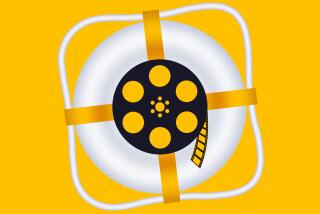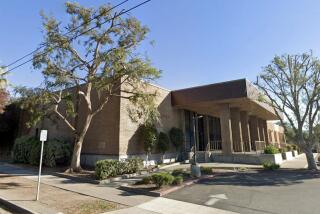Deadbeat Donors? : While Not a Widespread Problem, Bad Checks Are Proving to Be a Nuisance to Charity Event Organizers
- Share via
The man about town receives an invitation to a charity gala and writes a check for several hundred dollars for the tickets. Valets park his car at a luxury hotel. In the ballroom, he dances to an orchestra. He eats the free-range chicken and the tarte tatin , and rubs tuxedo-clad elbows with celebrities. He may even hope to see his name in the media coverage of the event for his conspicuous philanthropy.
Then his check bounces. Or, worse, he stops payment.
And probably nothing will happen to him, nor will he make the check good in most cases.
Several charity benefit organizers in Los Angeles say bad checks are a nuisance, although not a widespread problem. Therefore, most charities have little in the way of safeguards to deal with the few they do receive.
Why would anyone defraud a charity by spending an evening in deceit?
“Perhaps they feel a need to be seen, or to be in with the in crowd,” theorizes Judy Levy of Levy, Pazanti & Associates, a company specializing in event coordination and fund raising. “Other people might be trying to save face if they can’t afford a ticket and their friends are going to be there.”
Michael Anketell, who has chaired major benefits for AIDS Project Los Angeles, says he understands: “It’s a desire to hobnob with the stars, to come across as successful and be treated as a VIP. They want to be part of it and they’ll do anything they can.”
Anketell has had reason to think about the problem. In February, 1991, the California Fashion Industry Friends of AIDS Project Los Angeles held its benefit, a major annual charity event. The evening was a tribute to designer Gianni Versace, and 1,150 guests crowded into the Century Plaza ballroom to watch an elaborate fashion show. In the audience were the likes of Sylvester Stallone, Richard Gere and Jeff Bridges.
Anketell was pleased. The evening went off without a hitch, and the next morning, APLA was more than $500,000 richer.
Then the first check bounced. Then another. And another.
Eventually, seven checks totaling $10,800 were returned by the bank. Five came back for insufficient funds. A sixth had been written on a closed account. The seventh and largest, a check for $7,500 for a prime table, was marked “Payment Stopped.”
A year and a half later, APLA has been able to recover only $600 of the $10,800, and Anketell has gone from righteous anger to being philosophical.
“In a nonprofit organization like APLA,” he says, “everyone has a job to do. They don’t have the manpower to sit in a courtroom all day. So when someone writes a bad check, the agency just eats it.”
According to several event organizers, that’s the right approach.
When donors write personal checks, “we just trust that their pocketbooks are as big as their hearts. Thank God, we don’t come across too many (bad checks),” says Linda Ford, founder of the Spare Change Project, a fund-raising arm of the Family Assistance Program. The nonprofit group assists homeless families.
“Every event we get one or two (bad checks),” she says. “We’ll redeposit them, and if it’s still bad, we’ll call (the donors). But for the most part, it’s not a big deal.”
For the most part.
At an art auction to support the Family Assistance Program, one woman purchased $20,000 worth of art and charged it to her American Express card. Unfortunately for the charity, the woman’s soon-to-be-ex-husband had canceled the card. Event organizers had an embarrassing call to make.
“She said she couldn’t buy (the art),” says Ford, “and we told her that if she hadn’t been bidding, we would have sold this merchandise.” When she still did not pay, Ford had the charity’s lawyer send the woman a few pointed letters. They eventually came to a settlement--a settlement significantly less than $20,000.
“What can you do?” says Ford.
Large charities, such as Comic Relief, an annual comedy telethon to benefit the homeless, employ a “fulfillment house”--a middleman agency charged with collecting funds and disbursing prizes and premiums. Smaller charities, however, can’t afford such help, says Paul Bennett, Comic Relief’s director of promotions.
Bennett is also director of special events for Cancervive, a group for cancer survivors. Cancervive is a smaller organization than Comic Relief, and Bennett says that when the group gets a bad check, “you can’t really force it. A small charity doesn’t have the resources to turn it over to a collection agency.”
“I would certainly not hire a collection agency,” says Leslee Tarlov of Events Unlimited, a firm that coordinates events. “It’s charity. People are giving, and if somebody wants to be a jerk about it, it’s not worth the expense.”
After the Versace event, APLA volunteer Maxine Harris began sending letters and phoning the check writers. One man quickly replaced his check, adding extra money as a good-faith gesture. That left six checks, including those from a well-known designer, an art gallery owner and a Los Angeles fashion manufacturer.
The $7,500 check became the focus of a months-long collection effort. After telephone calls went unreturned, APLA sent the check writer a stern letter. There was no reply. APLA gave up.
Richard Walden, president of the relief organization Operation USA, is equally philosophical, despite having also been burned: “The last thing you want to do at a charity is to insinuate that (a donor) is dishonest.”
Walden’s bad check nightmare occurred several years ago at an art auction benefit. A San Diego man bought a painting for $25,000, then refused to go through with the purchase when his largess wasn’t mentioned in press coverage of the event.
“He said, ‘I’m tired of celebrities getting all the ink,’ ” Walden recalls.
Walden, a lawyer, wrote the man a letter, stressing that his action would deprive both the charity and the artist--but stopping short of threatening legal action. The money was never collected.
There are legal remedies. California Civil Code 1710 allows the recipient of a bad check to file a claim in small claims or municipal courts. Punitive damages can total three times the value of the check, but no less than $100 nor more than $500 above the value of the check.
Charities, however, seem loath to take bad check writers to court, preferring to handle the matter themselves.
For her celebrity bachelor auctions, Ford has drawn up a contract that the celebrities must sign. It states that if they don’t end up going on the date, they must refund the money to the charity. The charity then refunds it to the bidder.
At Operation USA auctions, the second-highest bidder for any item is now recorded in case the highest bid falls through. The group also doesn’t award auction merchandise on the night of the event, instead delivering it once the payment has cleared.
After last year’s experience, Anketell was apprehensive about 1992’s APLA/Fashion Industry bash, particularly because 700 tickets, nearly half the total, were sold in the 24 hours preceding the event. “There was no time to find out whether the checks were good or not,” he says.
But when the accounting was done for the April gala at the Century Plaza, where 1,100 saluted designer Thierry Mugler, Anketell was relieved. This year only two checks bounced.
More to Read
Sign up for Essential California
The most important California stories and recommendations in your inbox every morning.
You may occasionally receive promotional content from the Los Angeles Times.










